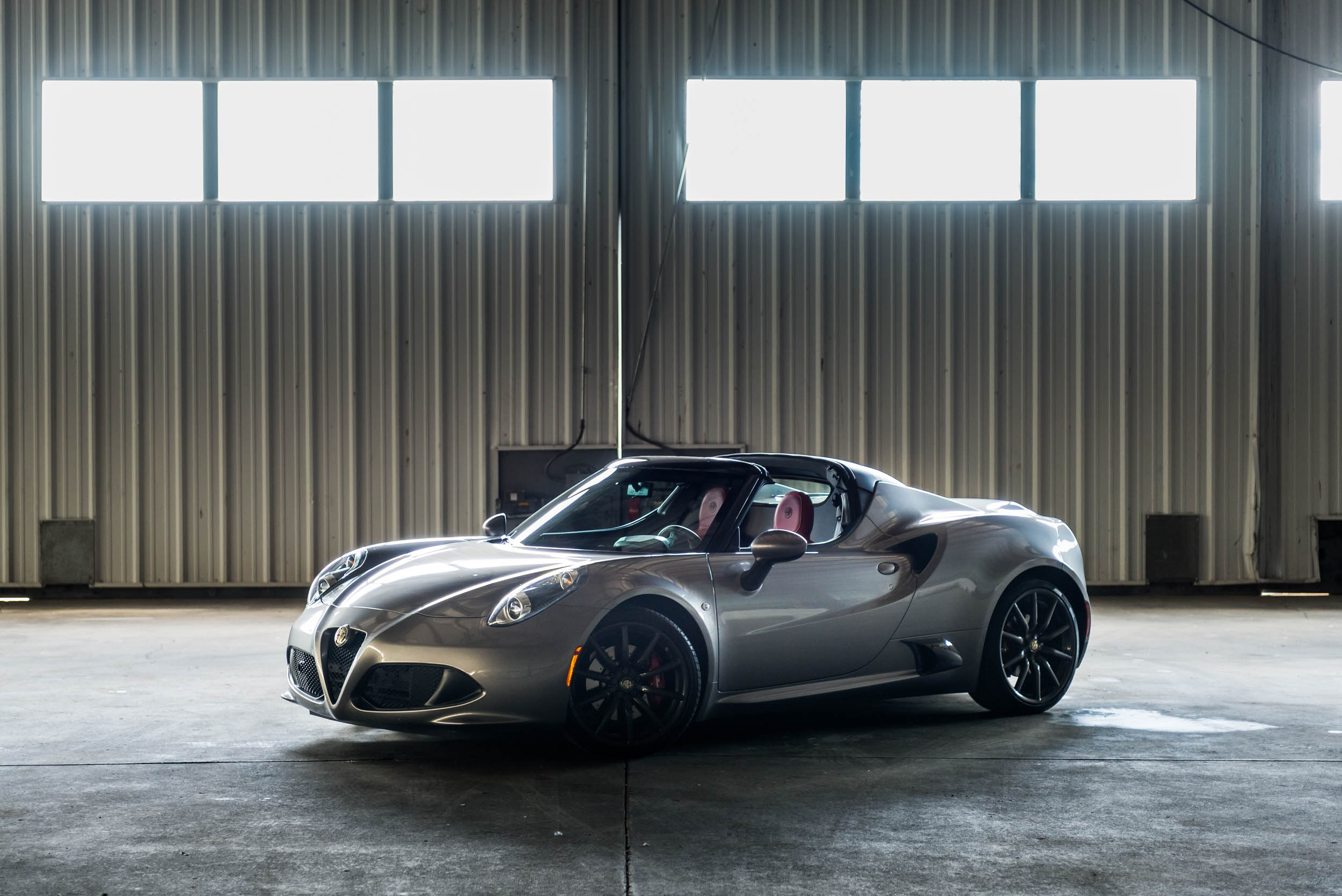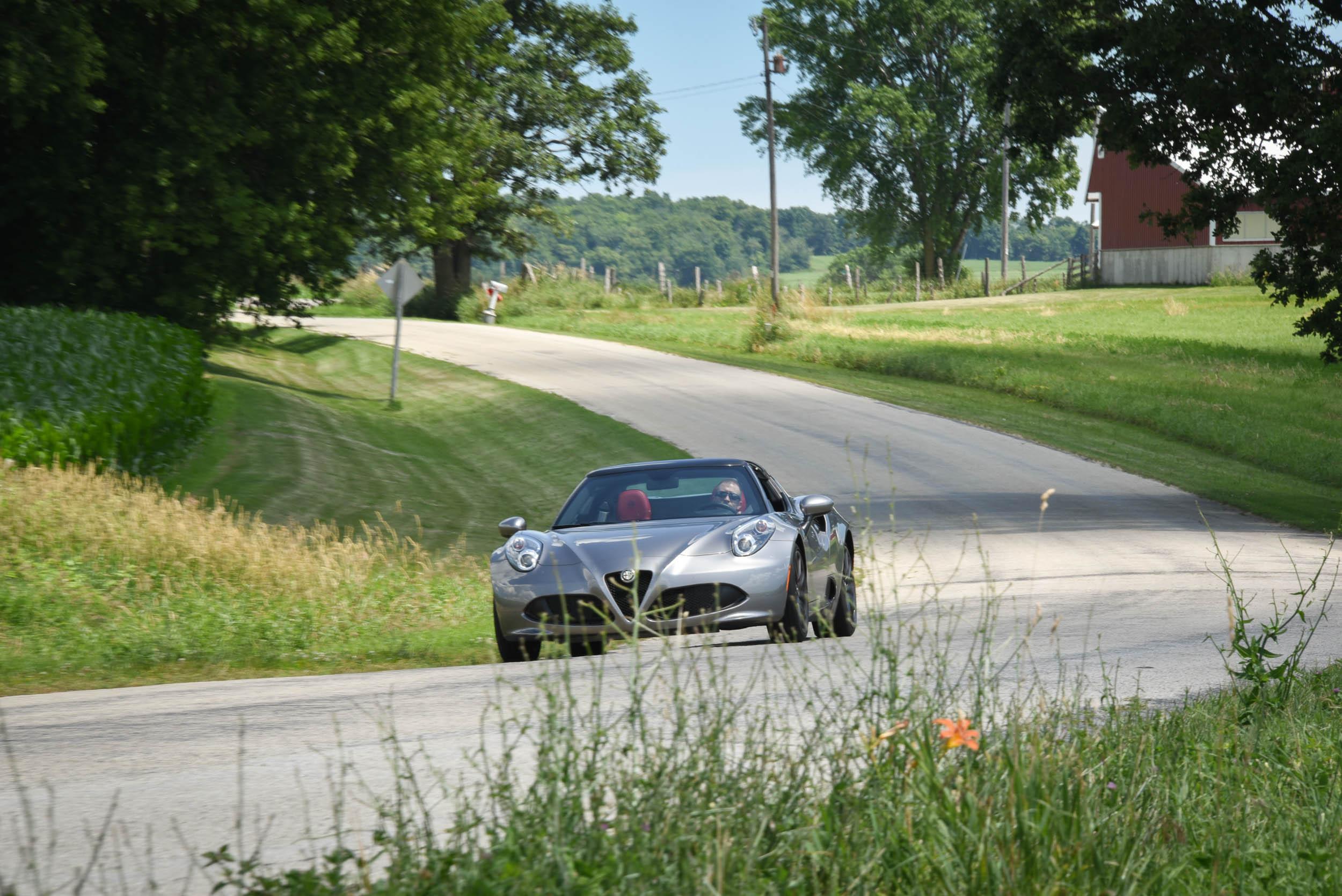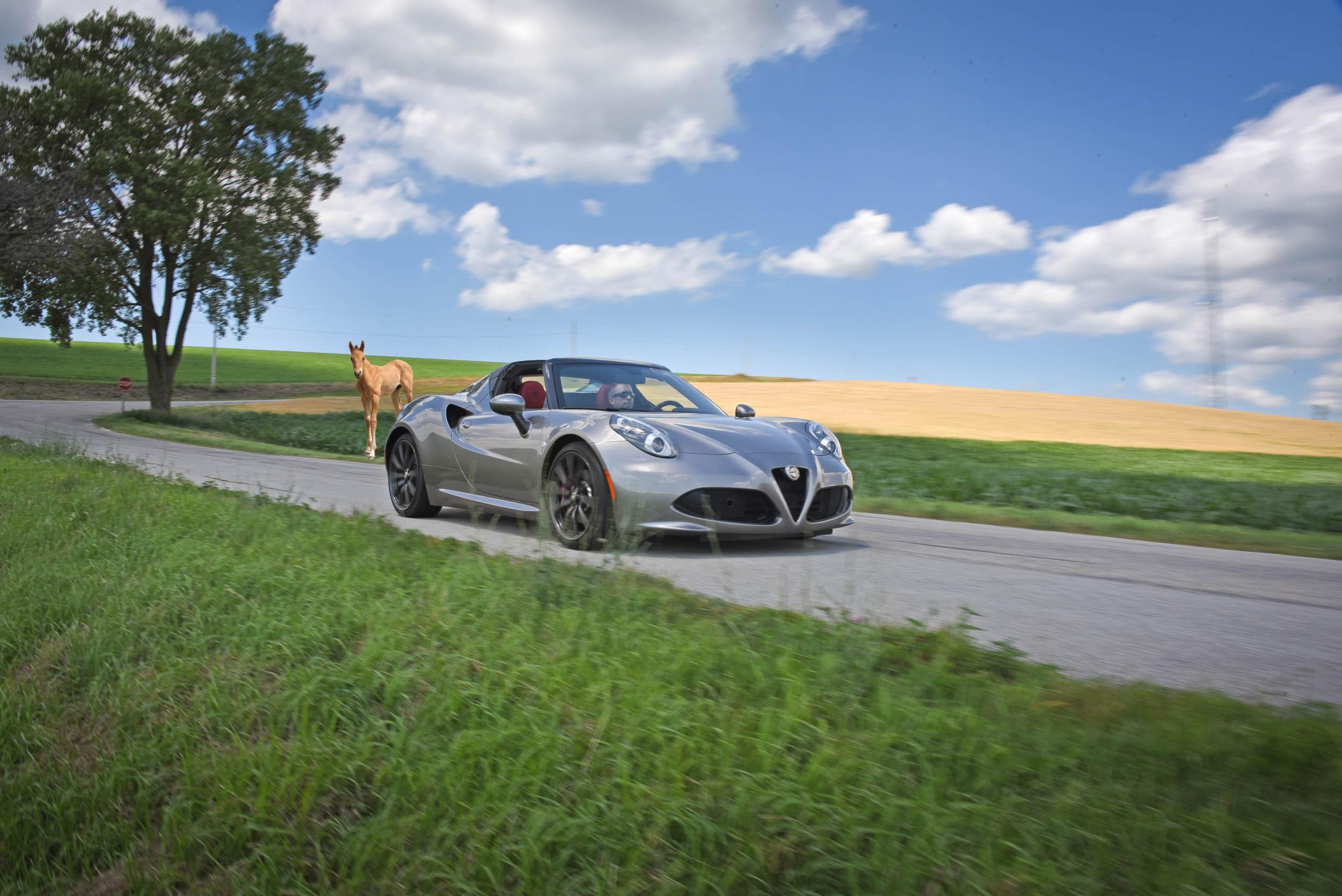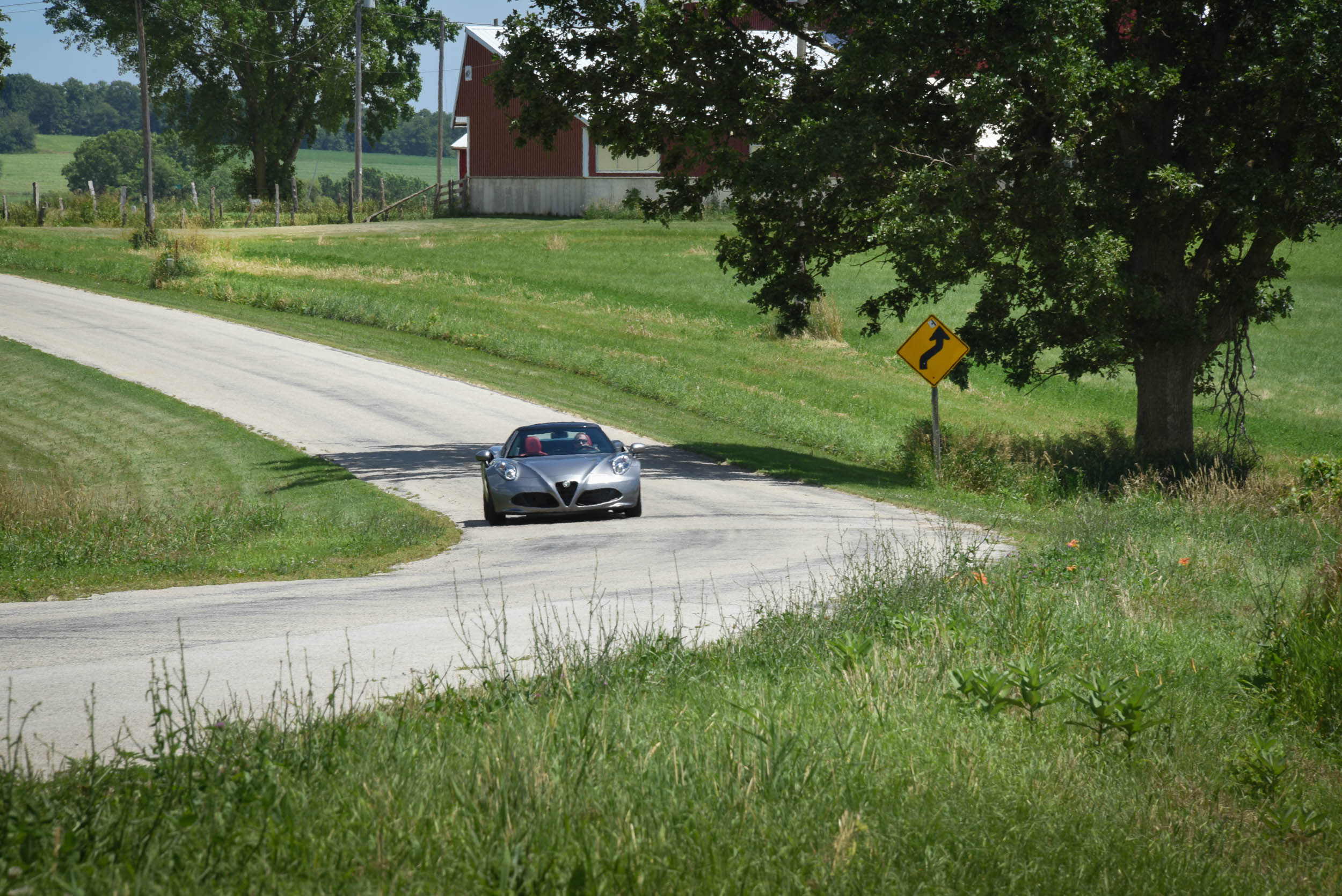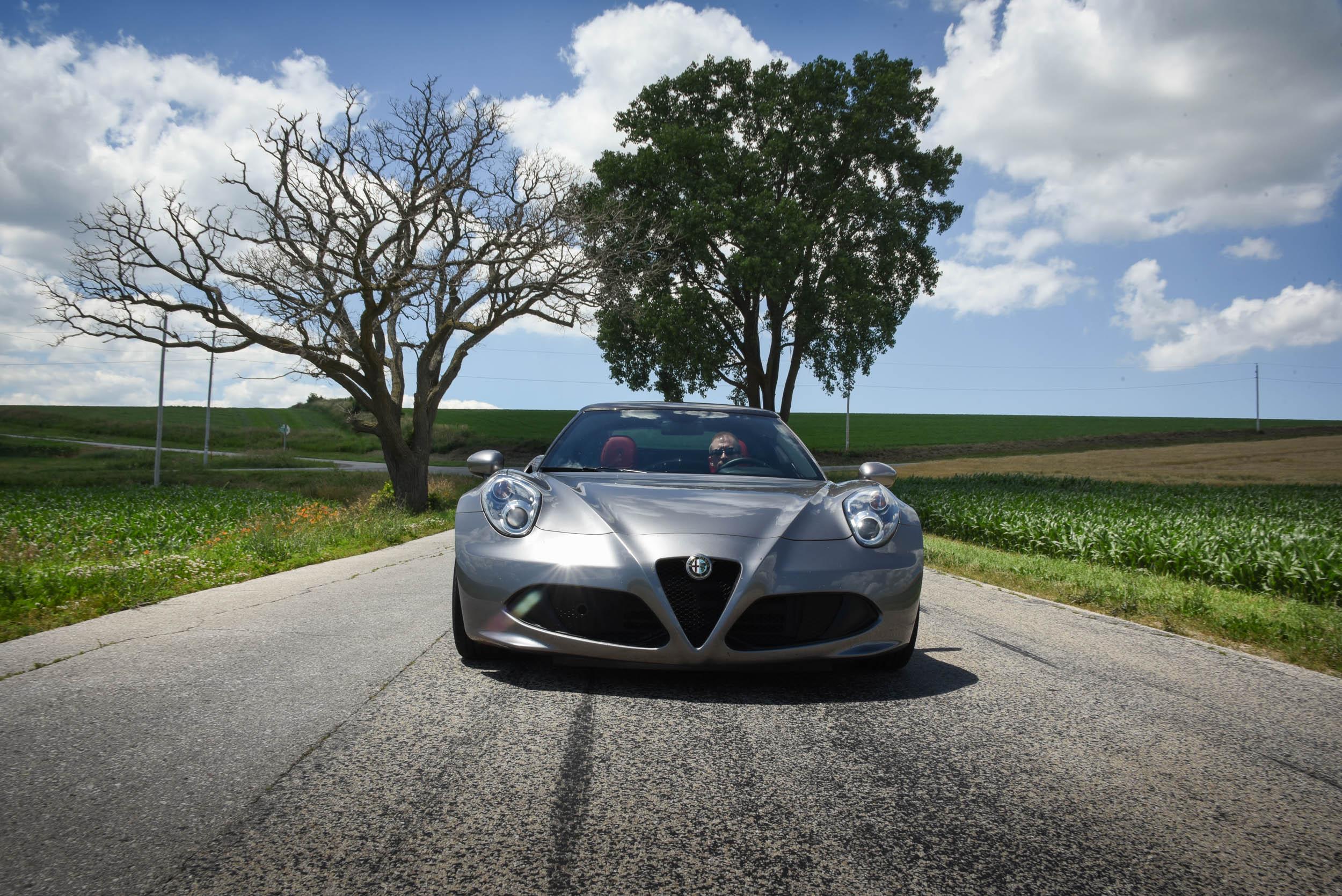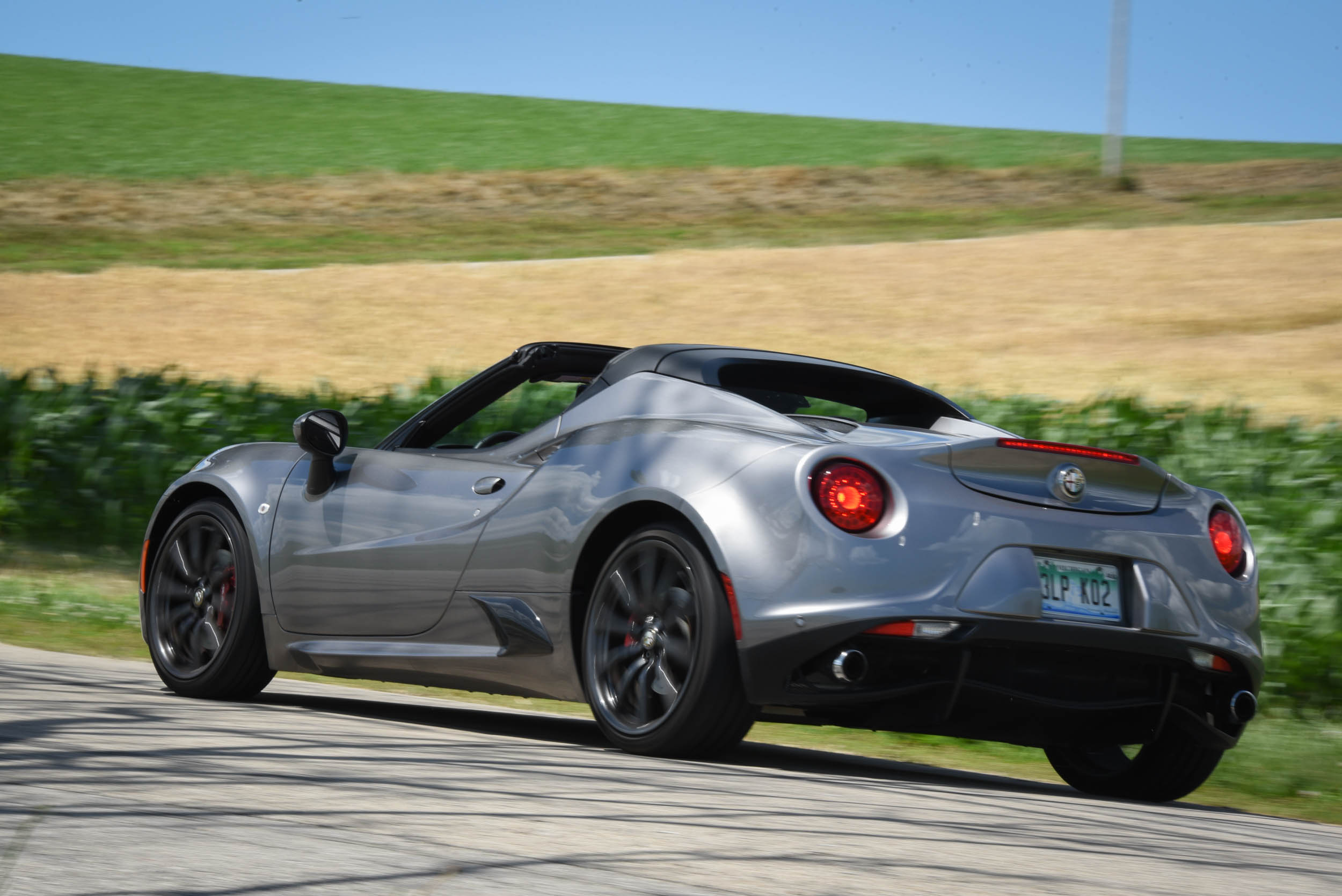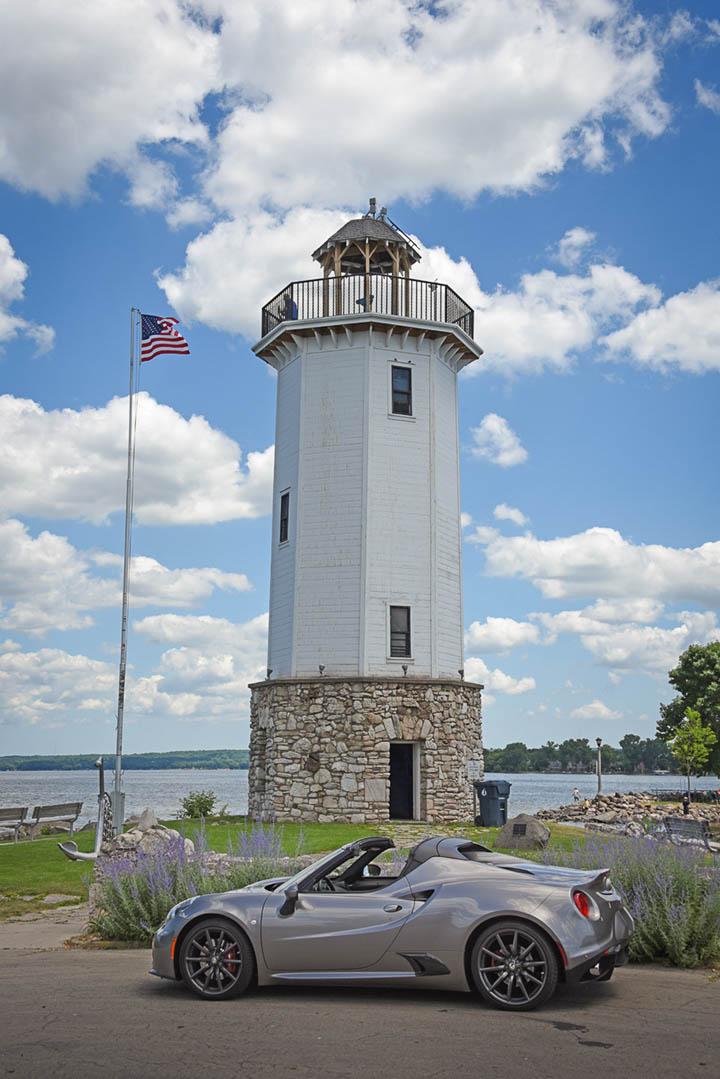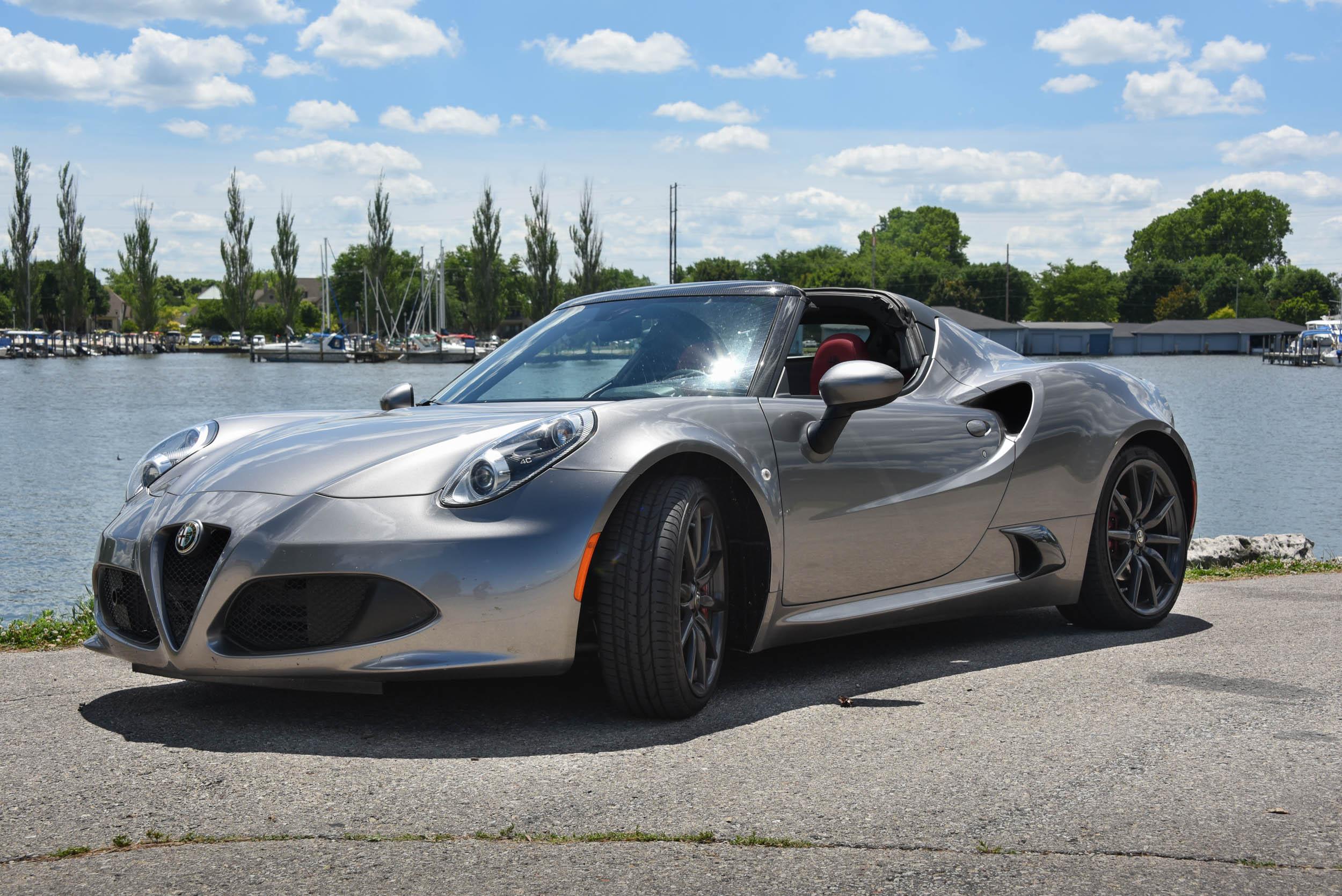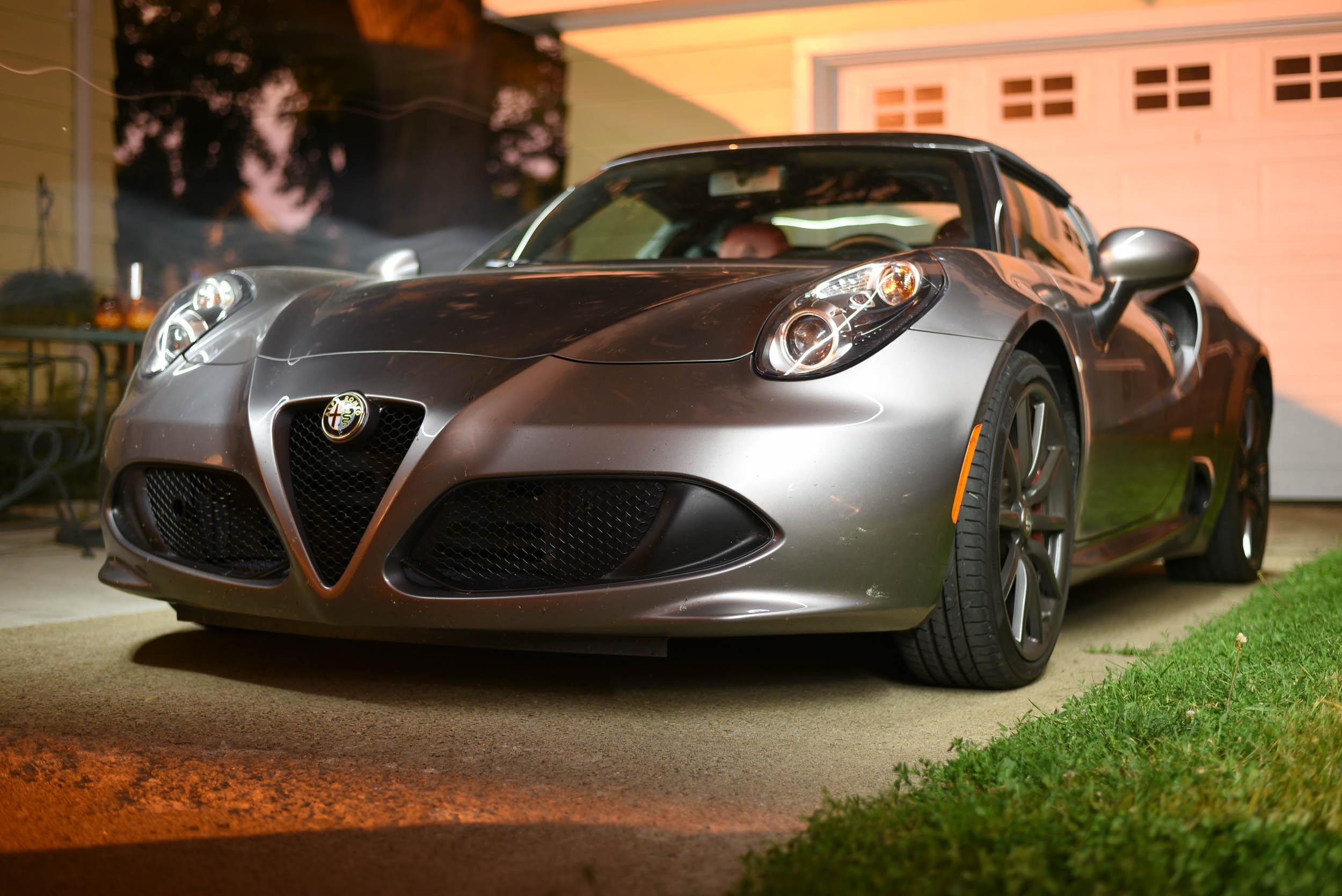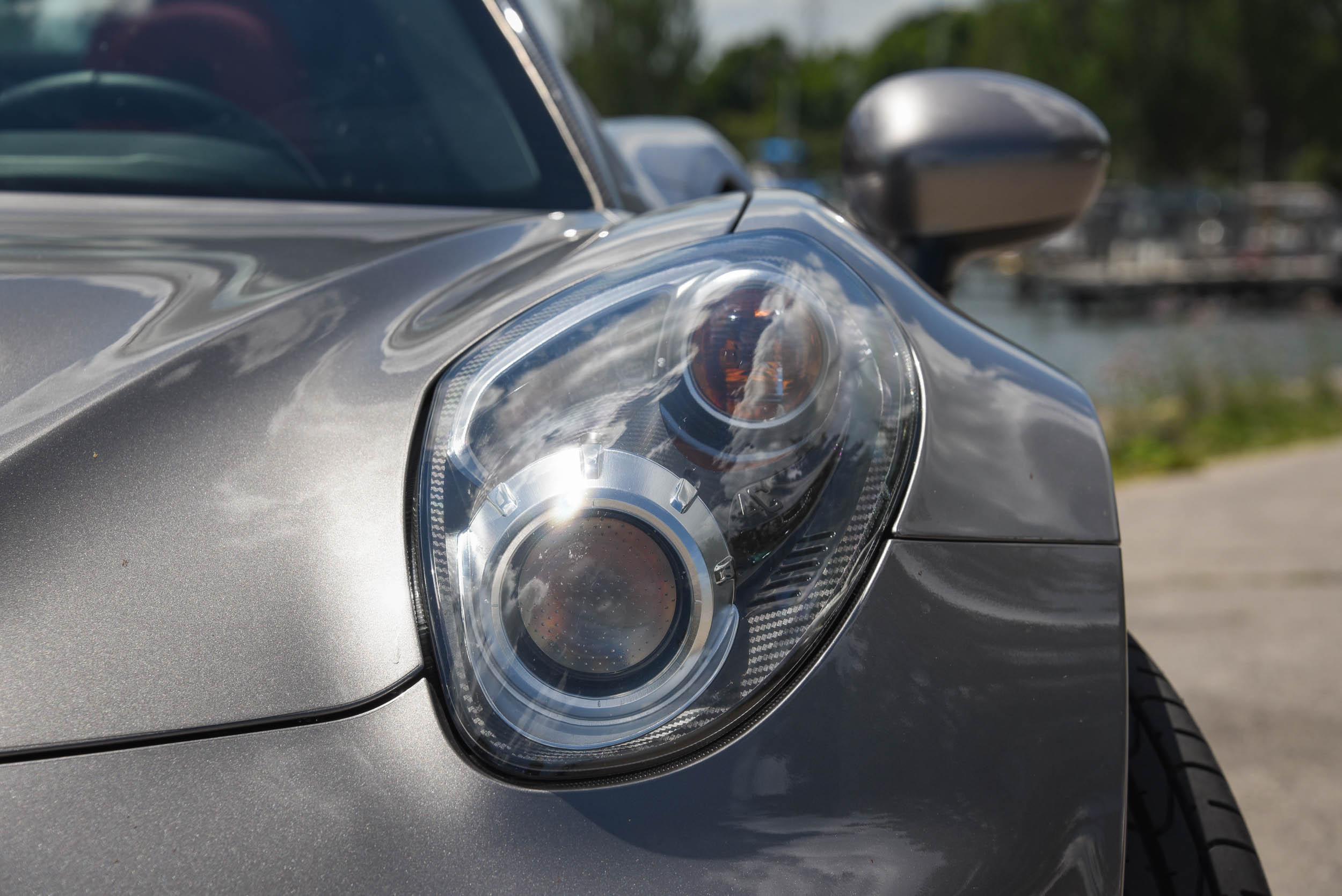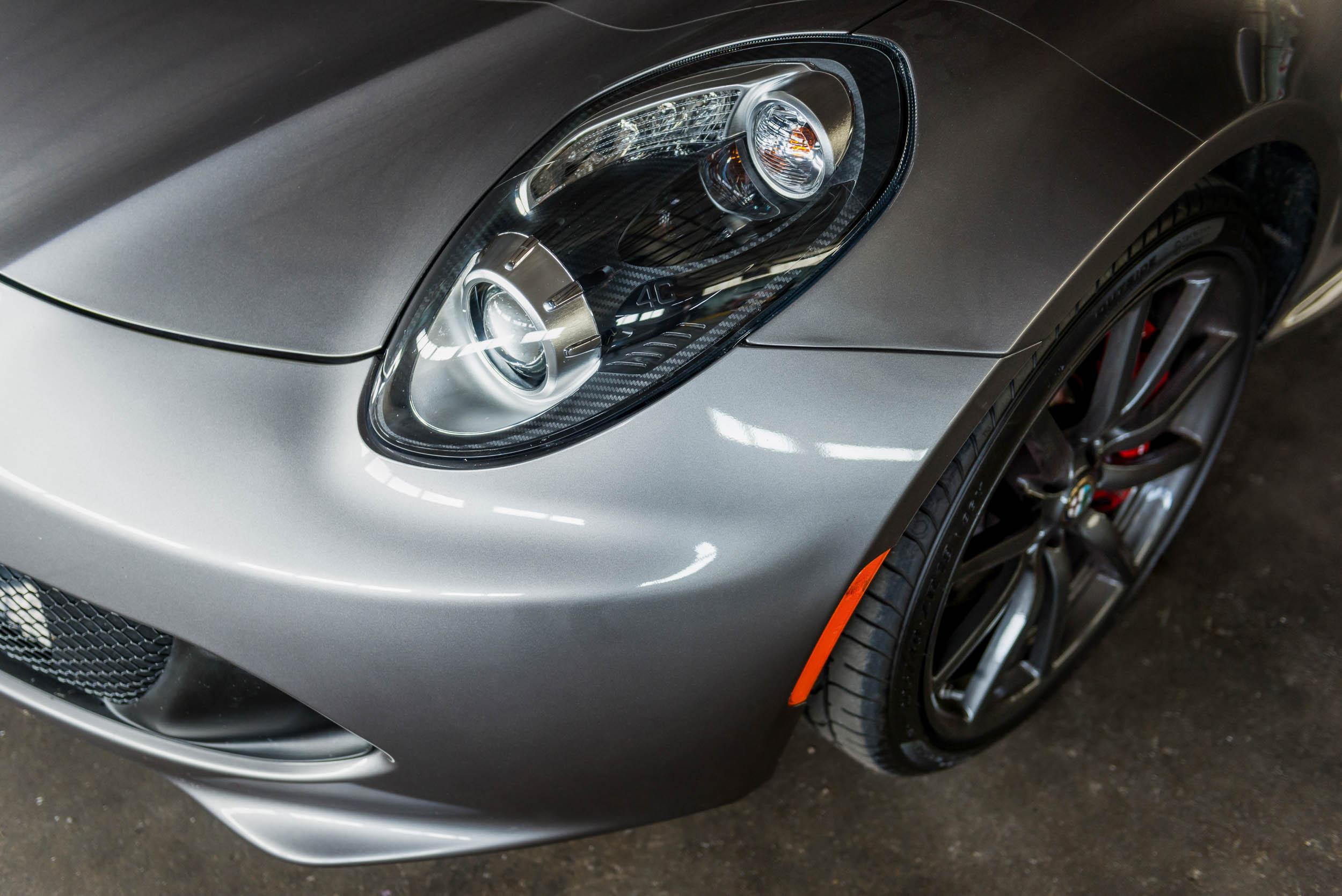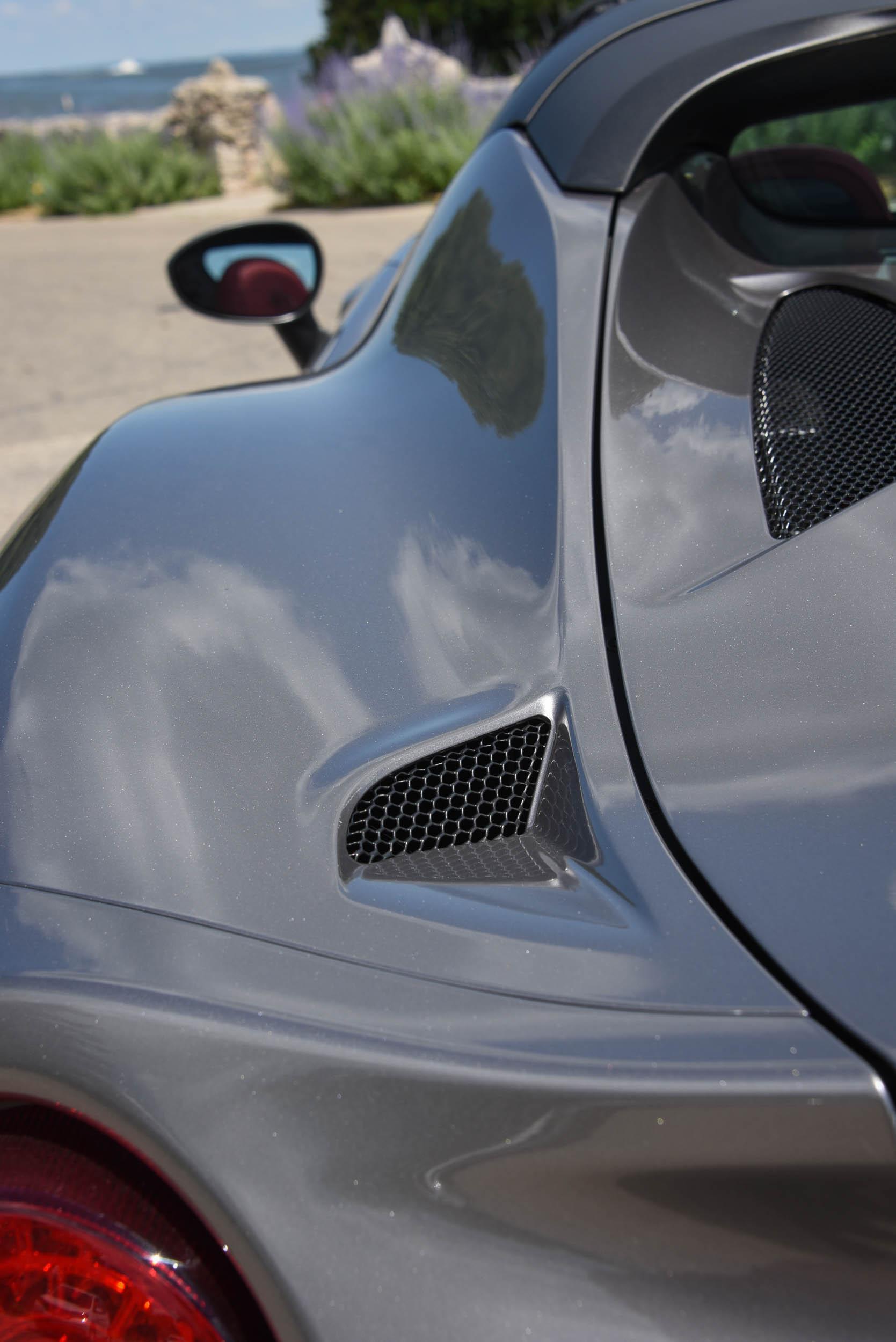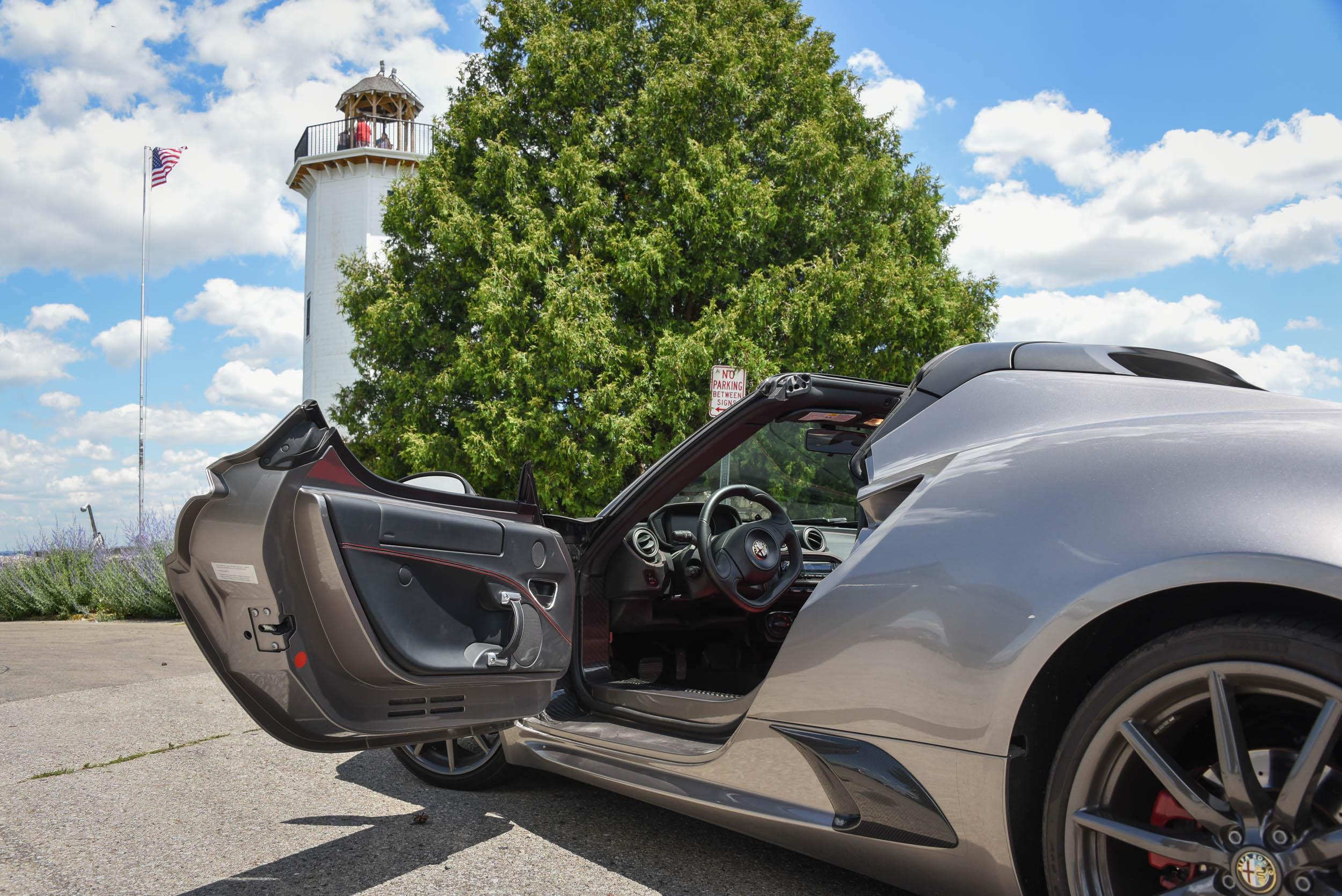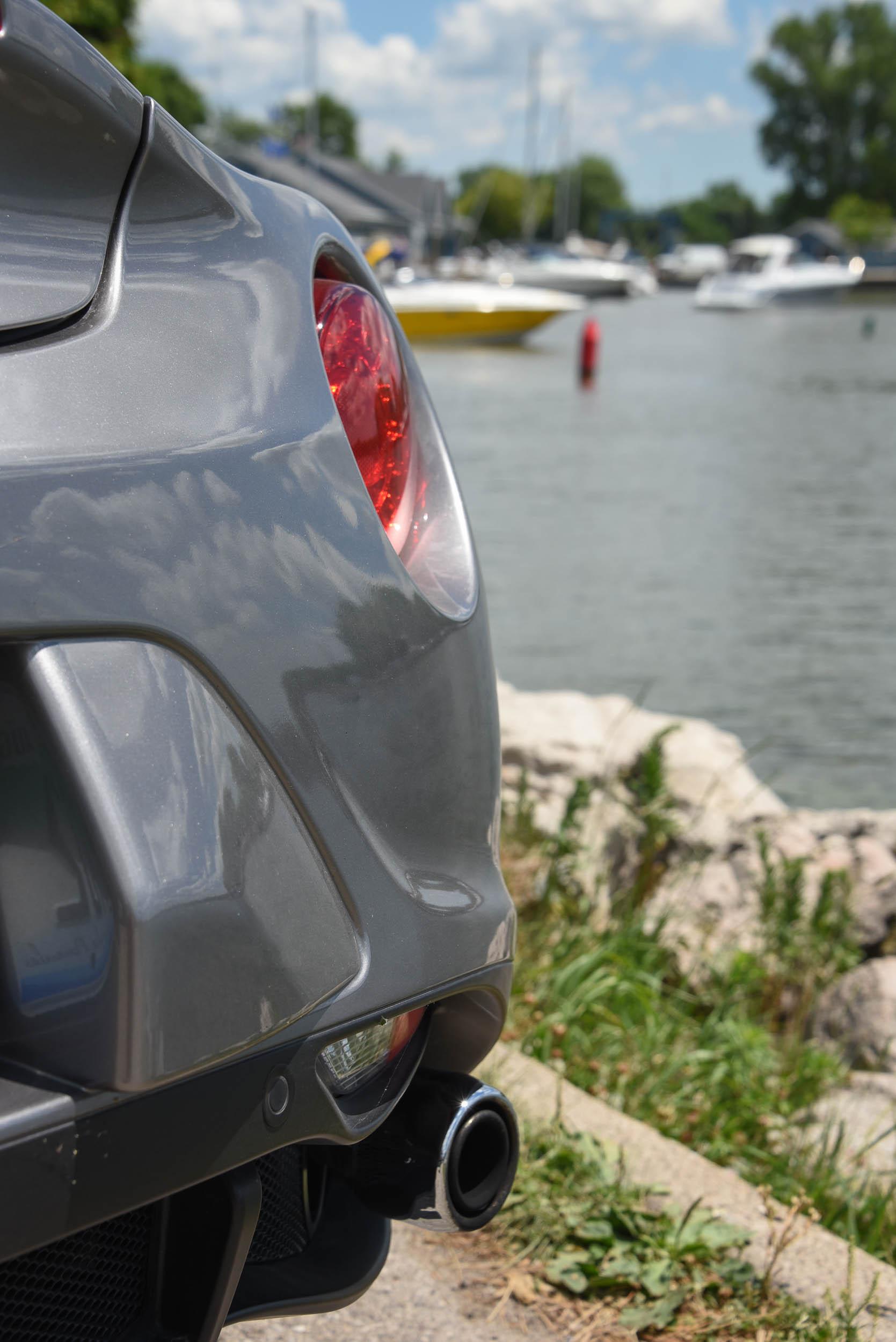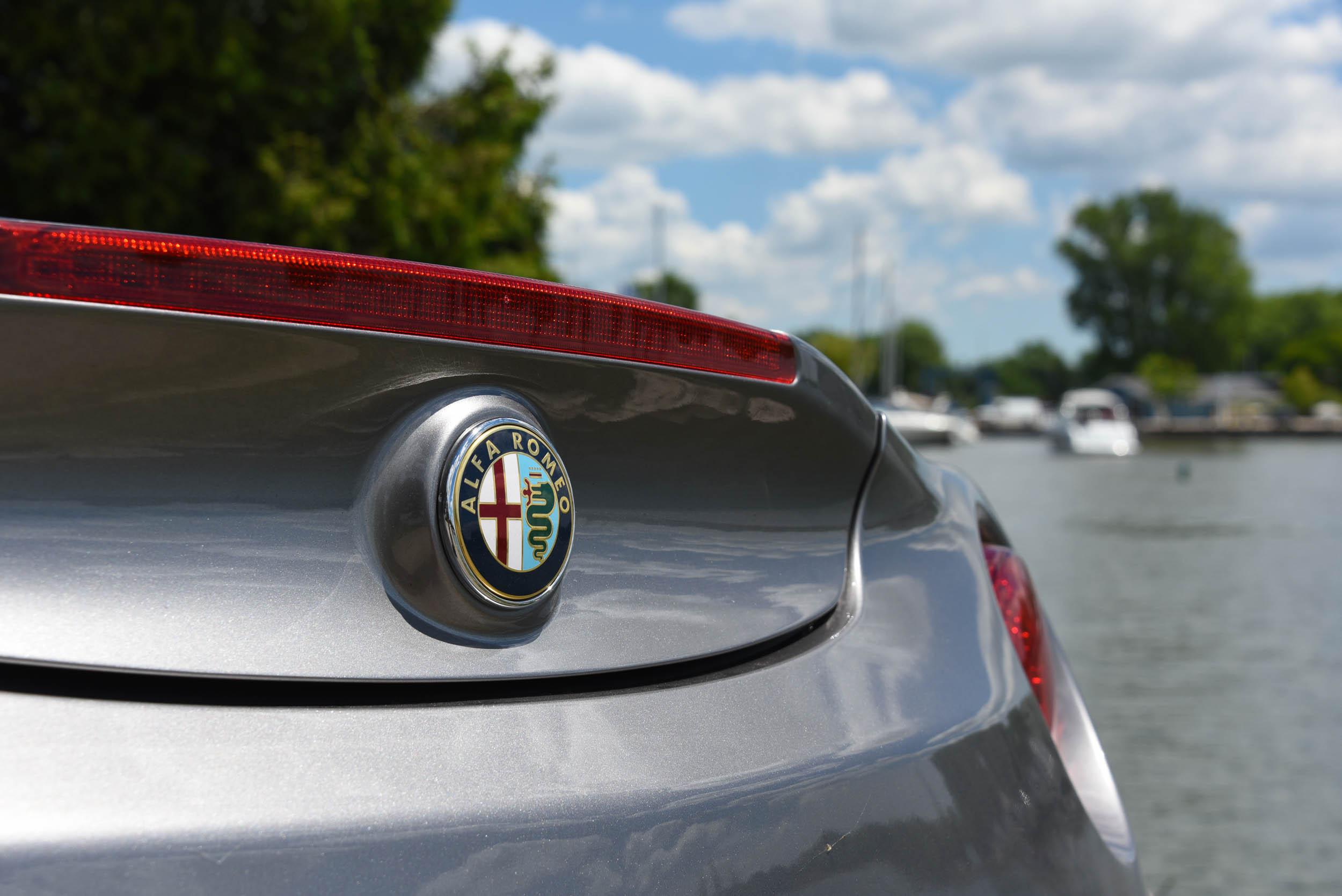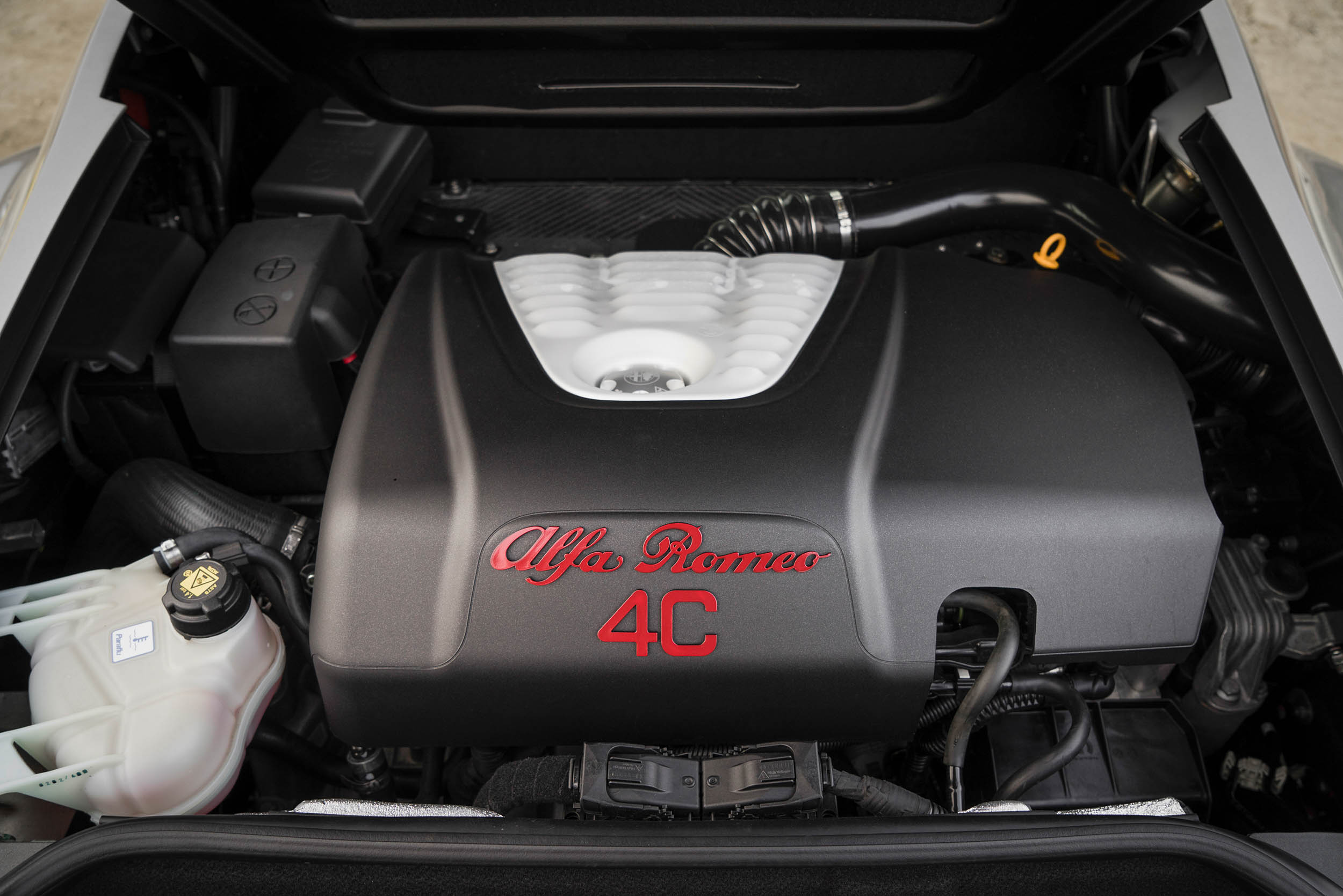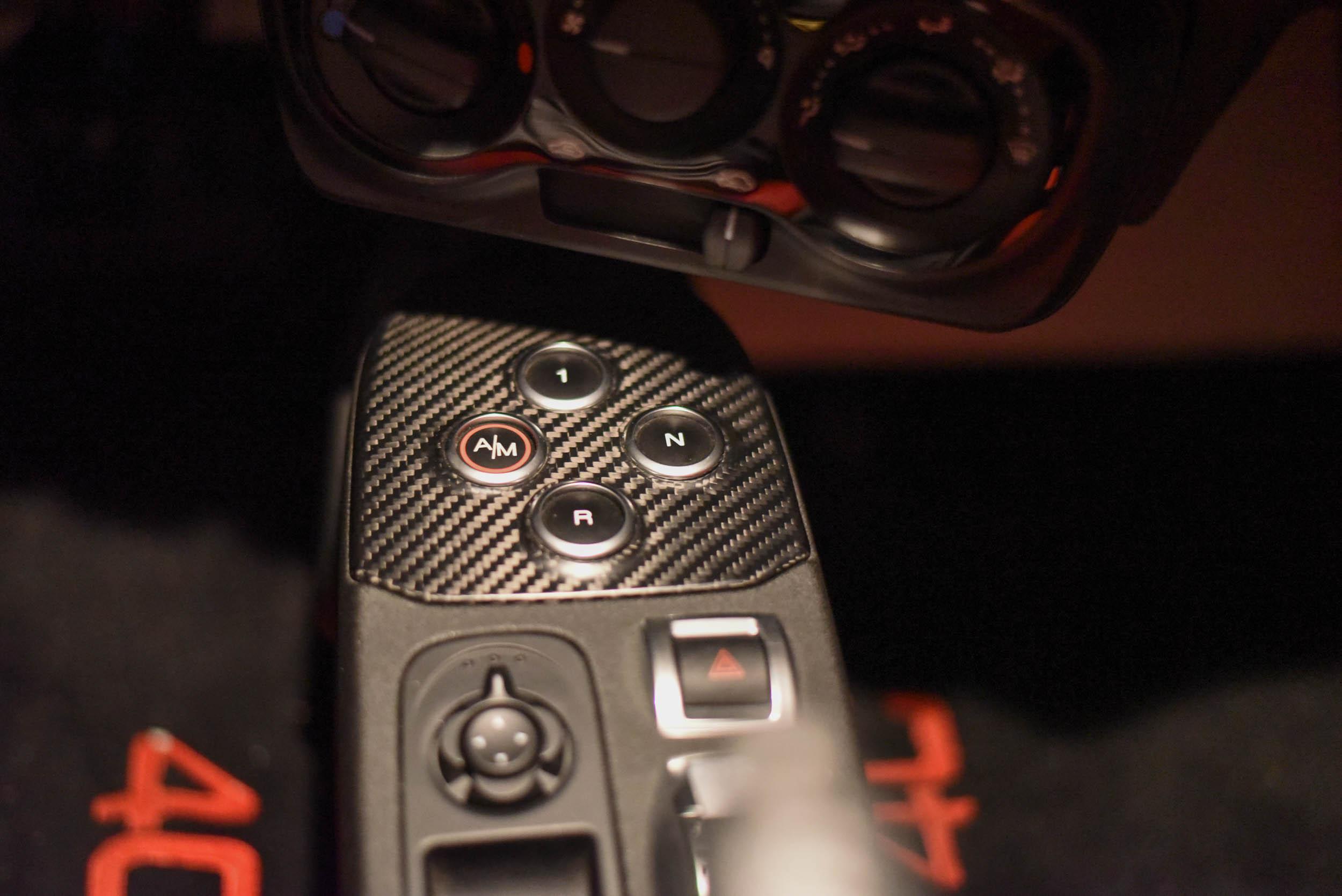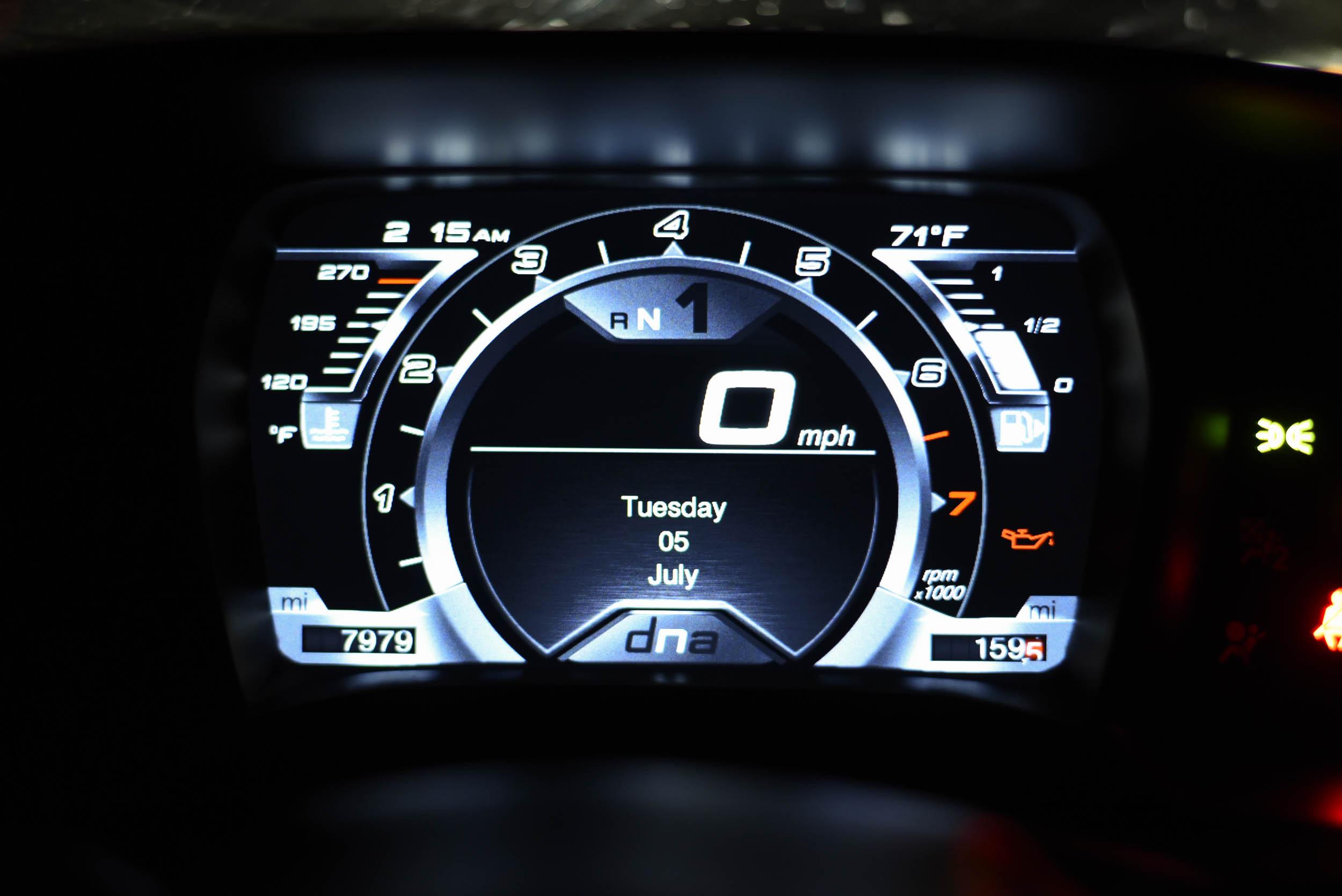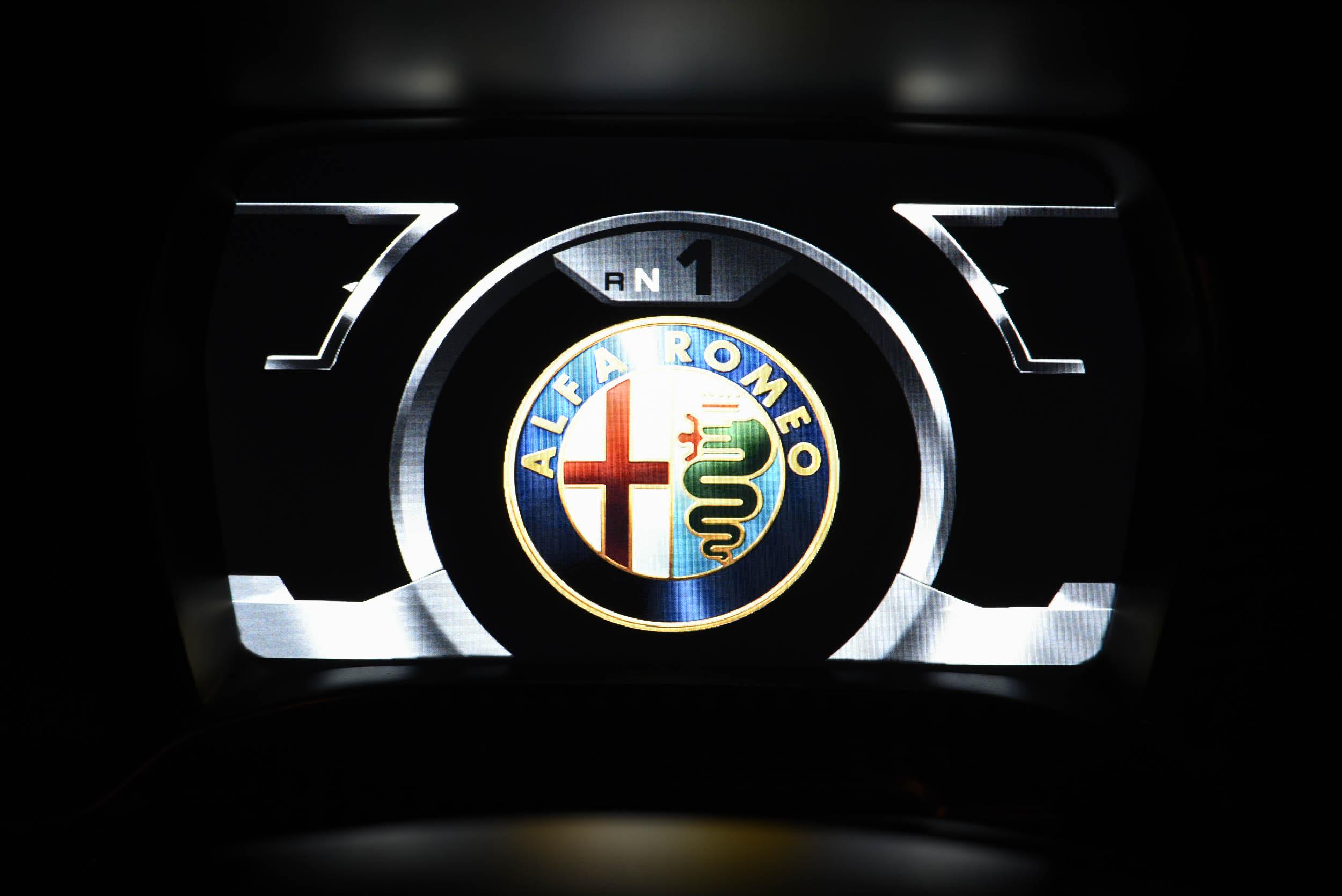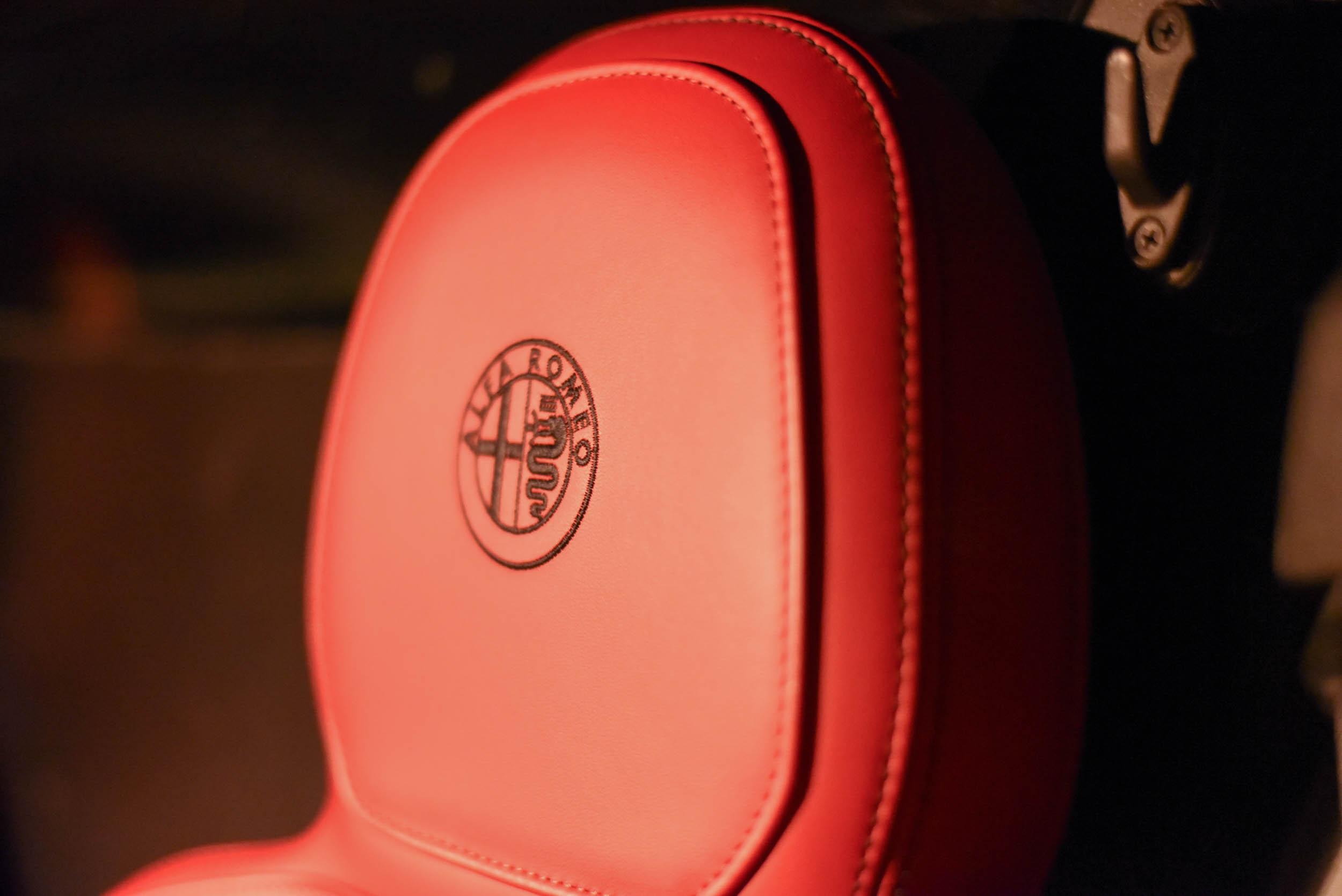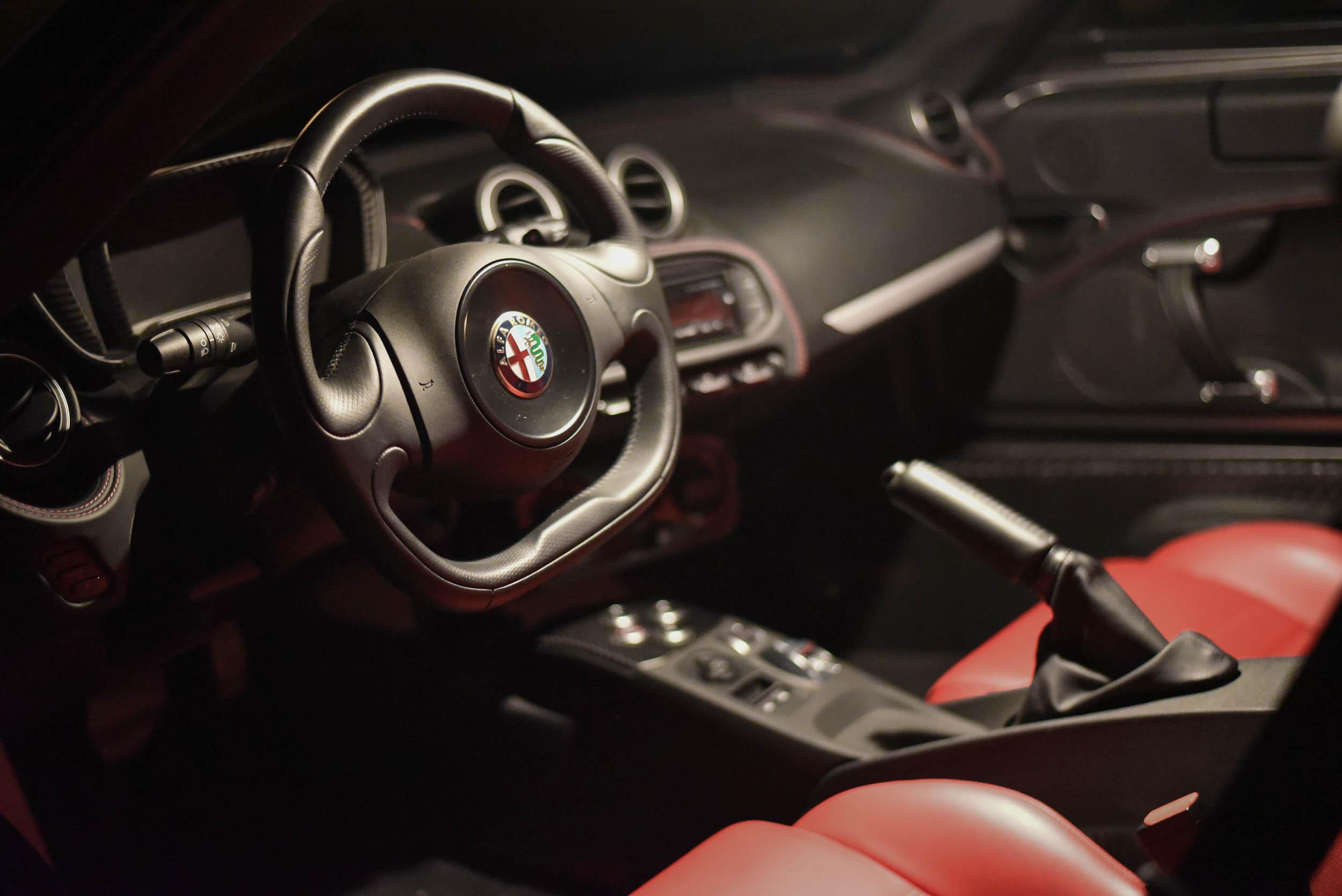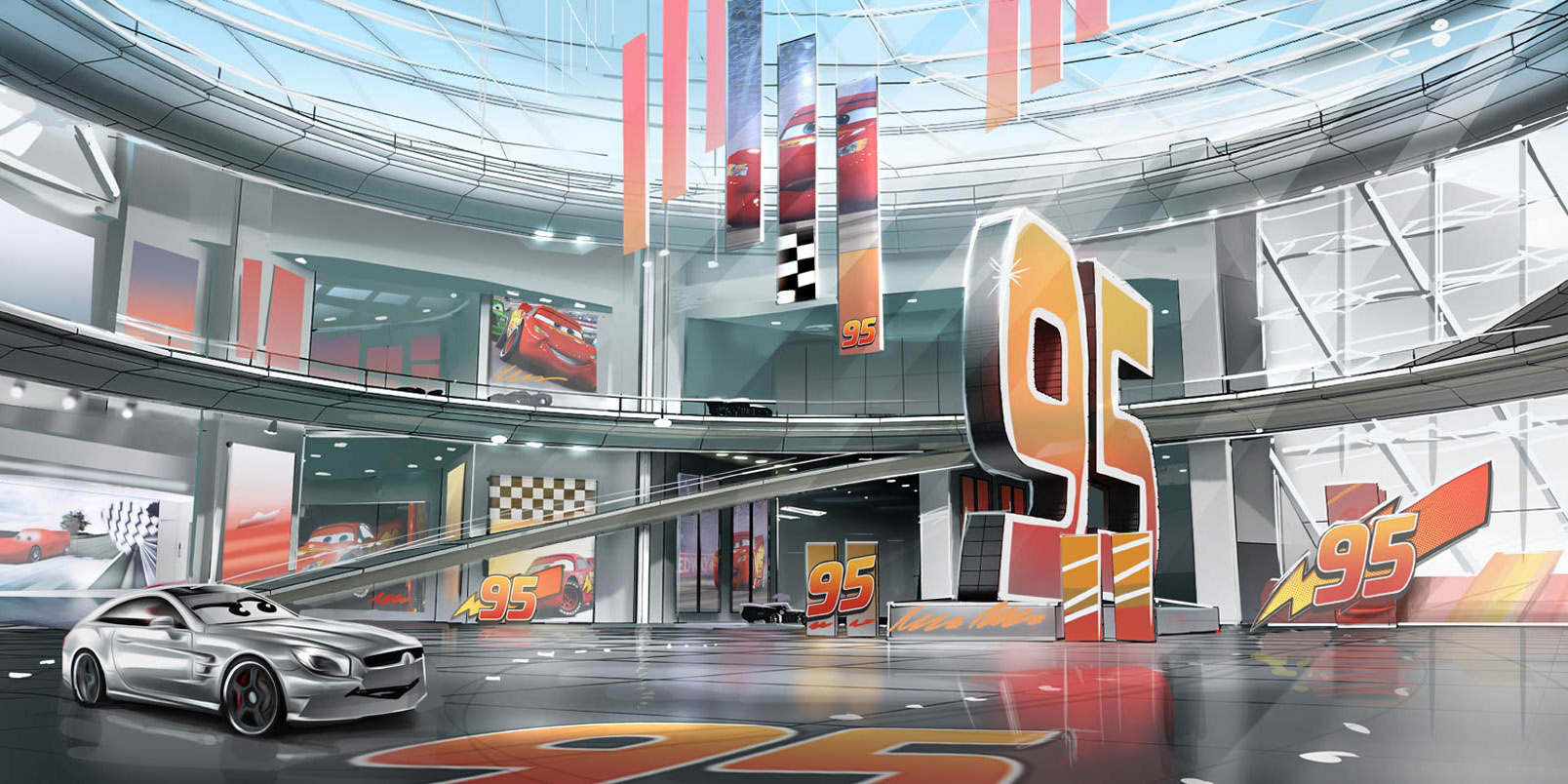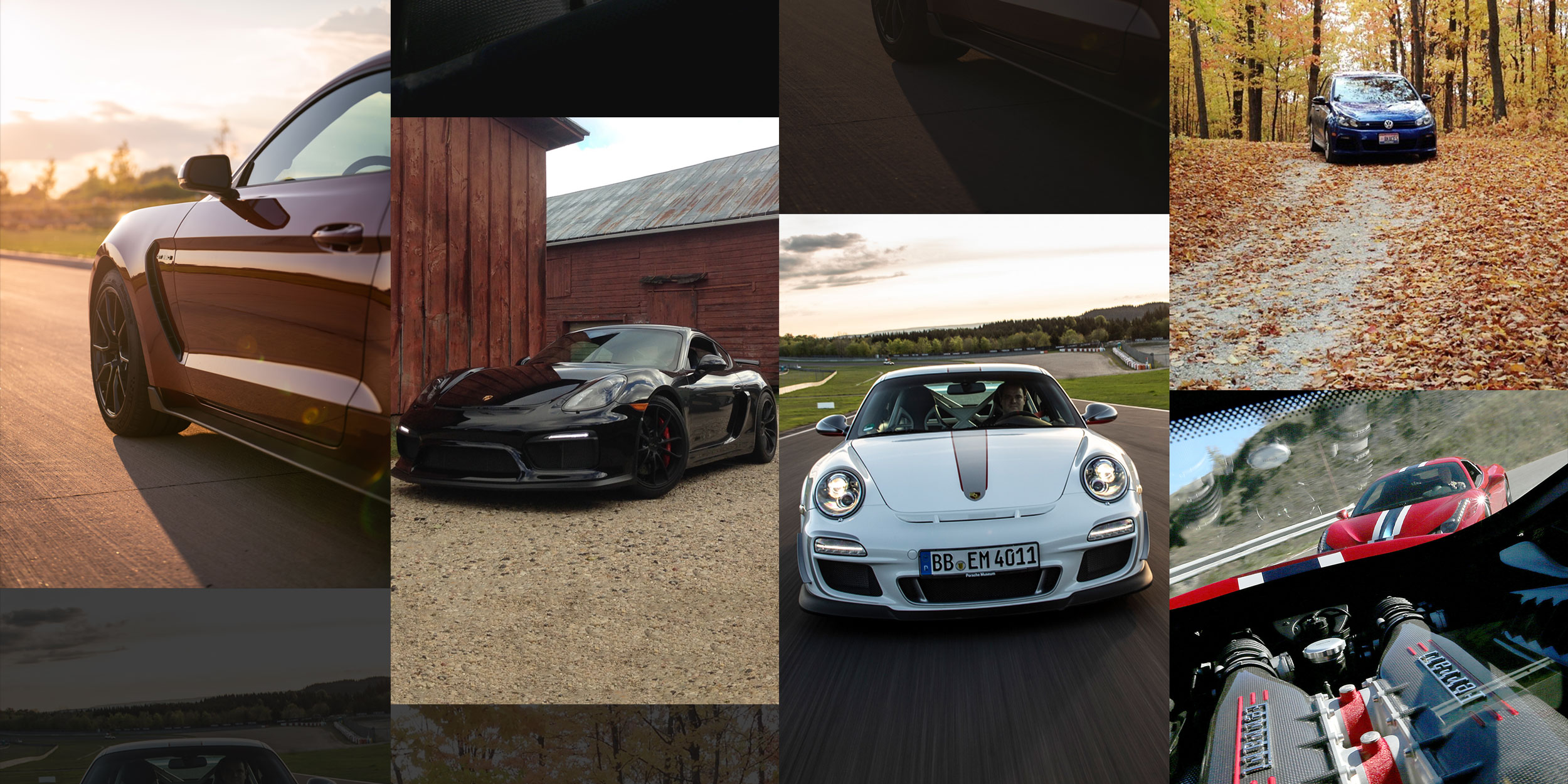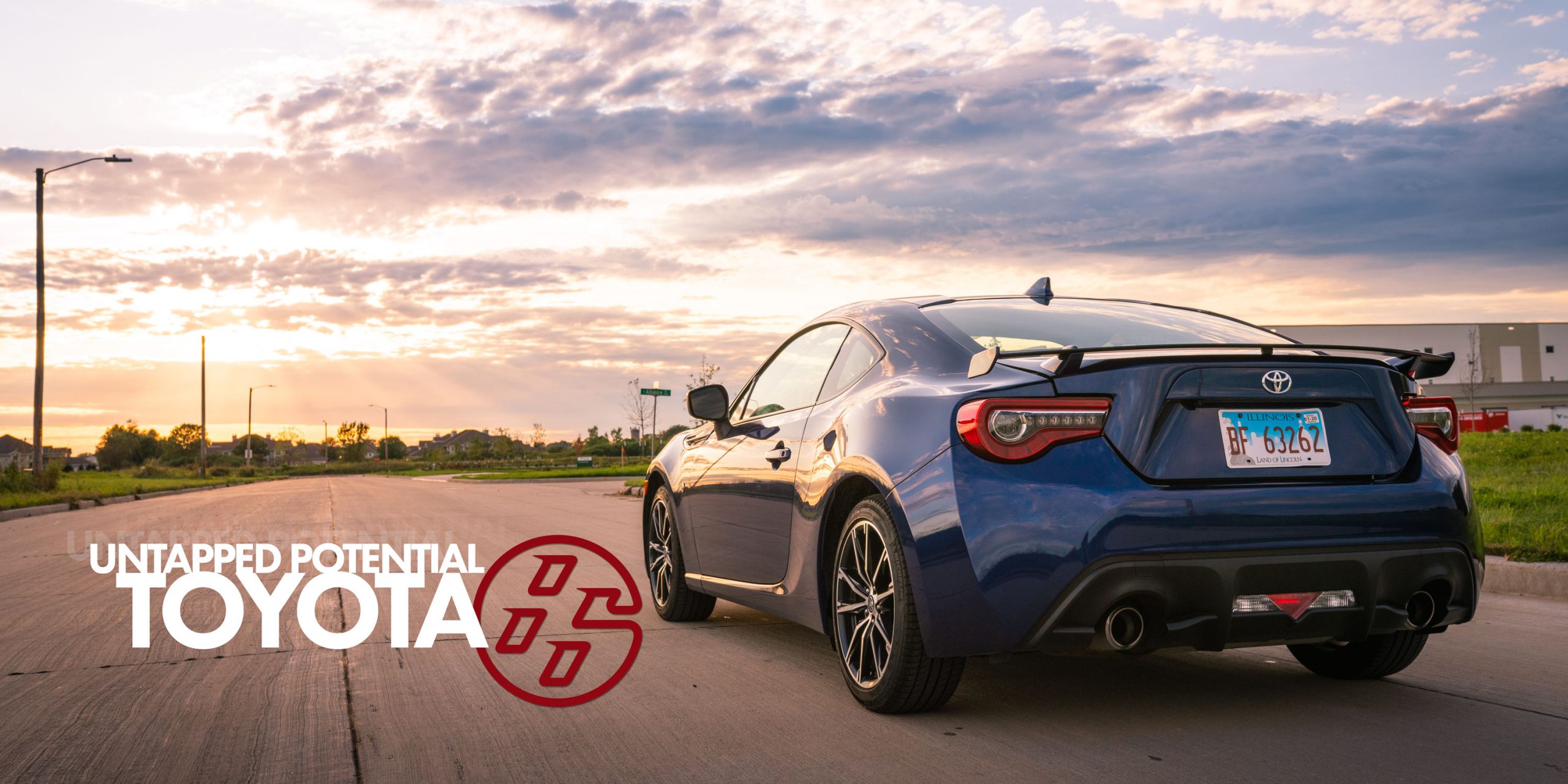2017 Alfa Romeo 4C Spider: Foal or Italian stallion?
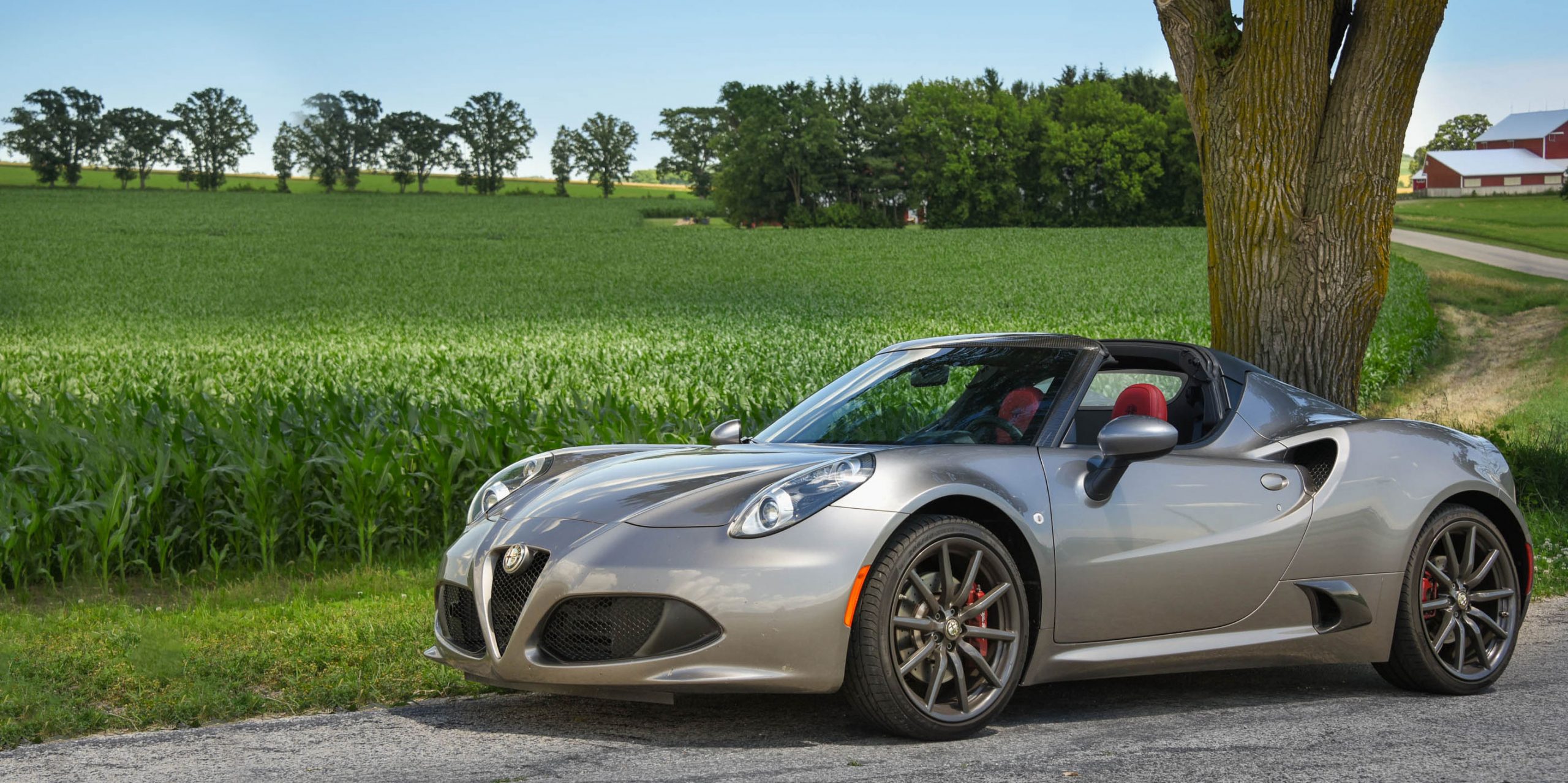
Words by Brian Griebenow
Photos by Jennifer Jensen
I could have done anything with my life. I could have been an Alpaca rancher or an engineer with some Fortune 500 consumer products company. Maybe I could have been a trombonist in a funk band. But I chose automotive journalism.
Why? Because it’s not a job. It’s a lifestyle.
For example, I had a brief fling with a sexy Italian model recently. Not much time, granted, but enough to realize that had it developed into a long-term relationship it would have been a love/hate thing. Equal parts thrill and frustration. Joy and anger. Laughter and yelling.
You may not yet know this model by name, but chances are you’ve seen photos. The face is as intriguing as the shape is captivating. The name? Alfa Romeo 4C Spider. (What, you were expecting Raffaella or Sophia?)
If you’ve gazed at the photos in the gallery below and find the styling of the 4C Spider alluring, you will certainly not find it disappointing in the flesh. The 4C is available as a Coupe or Spider (removable targa-like soft top), and both are drop-dead gorgeous. Gorgeous in the exact same way $250,000 Italian sports cars are gorgeous.
From most angles the 4C looks every bit the true exotic car, just thrown in the dryer on high-heat for 20 minutes.
APPROPRIATE USE OF CARBON FIBER
While we’re talking exotic, let’s consider the 4C’s chassis for a moment.
This is the only car currently available for sale in the US for less than about a quarter of a million dollars that is built on a carbon fiber monocoque.
To be clear, I am only a fan of carbon fiber (CF) in situations when it adds strength while removing weight. CF as decoration is inappropriate CF’ing. Having said that, I’ll confess I find the 4C’s CF tub to be pretty sweet indeed. And like a true model wearing just the right outfit, Alfa Romeo wisely chose to leave as much of that CF exposed as possible. The sills, the doorjambs, the floor—all naked carbon fiber.
Was this costly chassis solution necessary? Alfa claims it was to make sure the 4C was as light and strong and possible — though the new Miata is lighter still. So, who really knows?
The one thing I can say for sure about it is: It’s cool.
ALFA ROMEO DNA
The carbon fiber chassis is the single most exclusive chunk of high-techery here, but there’s more. Just like Ferrari, this Alfa Romeo is offered only with a flappy-paddle gearbox. True, other brands have gone this route as well, but when discussing a mini-exotic as bellissima as this one, it’s fitting to say, “Just like Ferrari.”
Alfa’s twin clutch transmission—TCT—is a quick shifter at 130 milliseconds from gear to gear. But if you want to work three pedals you’ll need to shop elsewhere.
A standard feature of the 4C is its selectable driving modes. Alfa calls their system “DNA,” for Dynamic, Natural and All Weather. These modes are supposed to tailor the “feel” of various systems to the type of driving you want to do. Each mode calls up a specific behavioral mix of the traction and stability controls, the throttle response and, of course, transmission shifting characteristics.
GIVE A SHIFT
Full disclosure: I am a die-hard fan of real manual transmissions with three pedals and a stick to row. So, I approached my first 4C Spider drive curious but already grumbling.
Grrmph-buttons-frkmfrakm-paddles. Deep breath, count to 10. Open the door, step in high over the (very cool) carbon fiber sill, gently lower myself into the driver’s seat, a little lower, lower yet and close the door.
Hold on! Just stare at that carbon fiber door jam a moment longer. OK, close the door.
Hmm, a pleasant enough cockpit. The seat feels good, not special or fantastic but good. Sitting in the 4C is a nested feel. Your glutes and hips are nestled between the doorsill and the center console. Straight ahead is a nicely contoured, flat bottom steering wheel. Ahead of that is a carbon fiber pod housing a roundish display screen that, when activated, provides a commendable array of operating info.
That CF pod is perched atop a stitched leather-covered dash. On the center console I find an array of 4 pushbuttons labeled “1,” “N,” “R” and “A/M”. Turns out R is for reverse, N for neutral and 1 for forward. Seems weird, but might be more intuitive if the 1 were replaced with F.
The A/M selects either automatic or manual shifting. There’s also a three-position toggle for selecting the D, N, and A driving modes.
PACE YOURSELF
OK, nothing terribly confusing here, and everything is almost sensibly laid out. Firing up the engine I’m greeted by what is essentially an unmuffled bark.
Loud exhaust is popular these days. I get it. But to my ear the 4C’s voice doesn’t so much say, “Fast Exotic Car,” as it does, “four-cylinder with no muffler.”
Seeing as I’ve just strapped into an Italian sports car, I select D for Dynamic. And since these dual clutch razzmatazz auto trannies are reputed to shift faster than me, I select A for Automatic.
Wasting no time, I pull out onto my first stretch of open road and—what else—floor it. Oh, mio Dio!! With that A/M button set to “A,” the jump to naughty speed is executed with effortless lightning fast shifts, each one punctuated with a BRAPP of exhaust flatulence.
The Alfa Romeo 4C Spider is quick — as in low 4-second range to 60 mph, easily keeping pace with the likes of the current Mustang GT or Cayman S or many not-very-old Ferrari’s.
Recognizing that it’s wise to start a new relationship slowly, I back off and steer the Alfa onto a mundane two-lane county highway. Cruising along behind an SUV at a steady 60 mph allows me to acclimate to the feel of the machine while the minimal seat cushion adapts to my backside — or vice versa.
I tend to enjoy small cars, and the 4C delivers on all that implies.
It truly feels like you’re wearing this car rather than sitting in it. When I strap on a tiny sports car, I just know the driving experience will be visceral. The car will respond immediately as though it anticipates my intentions. It will communicate the texture and nuance of the road in a way that allows me to drive at the edge with confidence.
TURBO LAG DRAG
So, this 4C is going to be great. Or is it?
Steady-state cruising soon feels like a waste of a perfectly good exotic. What to do? Pass that SUV!
A quick jab of the throttle, and [one Mississippi, two] off we go!! Wait. Do that again. OK, steady cruise, drop the hammer, and [one Mississippi, two] off we go!! What the –?
Grab a hammer off your pegboard, hold it at arm’s length, and let go. It accelerates toward the floor immediately. No delay.
But for the 4C, Alfa has chosen to introduce noticeable — scratch that — inexcusable lag time into the simple act of dropping the hammer.
What’s the cause? Look no further than turbo lag.
I mean turbo lag of the variety not felt since SAAB bolted a snail to the engine in its 900 back in 1979 and slapped blatant “TURBO” badges on the hood. But glancing at my desk calendar I see we’re now 15-20 years past the era when even SAAB found ways to deliver virtually lag-free turbo thrust.
AUDIO FAIL
Memo to Alfa Romeo: 1980 called, and they want their turbo lag back. Oh, and also their Alpine head unit.
Yes, the 4C has an Alpine unit, and as the only touchpoint between the driver and (I use these next two words relatively loosely) sound system, it is simply ridiculous.
The very first time I lowered myself into the Spider’s driver seat, despite being captivated by the carbon fiber tub and the general exotic ambiance, I noticed it and winced. The rest of the cabin is neat and tidy, and the Apline unit is just so out of place.
Like Mariacarla Boscono smiling and exposing a full set of braces, with a fleck of fresh basil.
But let’s get back to driving.
ON THE ROAD, AGAIN
There is much to adore about the feel of the 4C Spider. This is no thrown together, flimsy flyweight.
Despite being very small and, yes, impressively lightweight, the 4C feels relatively solid and well built. The ride is firm but never harsh. Pavement imperfections are felt but dealt with confidently. No flex or creakiness here.
Steering feel is good and yet disappointing.
As auto manufacturers shift further away from hydraulic power steering toward fuel-saving electric steering systems, Alfa chose to do an about face and install a purely mechanical, non power-steering system in the 4C. In a small car like this, it should have been a perfect approach.
But something is amiss.
The feel is very heavy at a crawl and frighteningly light at extra-legal speeds. I can’t help thinking a properly designed unassisted system could feel heftier and deliver better road feel.
Despite the less than optimal steering feel, cornering in the Alfa 4C is satisfying. The car feels—and is—very wide in relation to it’s length.
With a low center of gravity, wide stance and stiff chassis tub, you’d expect this car to be fun on a twisty road. And you’d be right.
The one complaint I’ll offer here ties back to the turbo lag I mentioned earlier. If you enjoy entering a fast bend, getting on the gas and powering through the turn, the 4C’s delayed response can be frustrating.
Enter turn. Poke the throttle hoping to invoke a hint of oversteer. Nothing happens for a moment. And then the power comes on far too late. Grrr.
I found myself glancing around for a penalty flag for “delay of game.”
While I’d rather row my own gears, admittedly this automatic works quite well.
The electrons and compu-magic all enable the TCT to do cool things. Like perfectly executing downshifts while in full auto. In Dynamic mode, with the TCT in “A,” just get off the gas and enjoy the sequence of blip-throttle downshifts and engine braking all the way down to a crawl. Slick.
Selecting ‘M’ does allow you to paddle your way through the gears if you choose, and if you keep the engine on full boil, it can alleviate some of the notorious turbo lag.
RAIN DELAY
Spider or Coupe, the driving experience is largely the same. But the roughly $10k premium for the Spider does offer an open cockpit. To see the sky you need to remove the framework-and-canvas roof panel, which can then be folded (rolled) up and stowed in the (teeny) cargo compartment aft of the engine.
Facing a rainy drive one morning, my first attempt to re-install the top took about 10 minutes of trial and error. Once I was on the road in the pouring rain I found that I had, indeed, erred. After 10 minutes of face spattering, I pulled off at a fuel station and revisited the installation process.
Suffice to say, getting it right is rather simple and it provides an open-air version of the 4C with virtually no penalty in terms of weight or rigidity. The targa-top is a win.
IN SUM
Is the Alfa Romeo 4C Spider an affordable exotic that any buyer is bound to love in every way? No. As I said, it’s a love/hate thing.
So, let’s recap.
On one side of my ledger I find too-light steering, a Yugo’s audio head unit, ’80s turbo lag and lack of a manual transmission.
On the other side there’s exotic styling, high tech carbon fiber chassis, stunning looks, light weight, thrilling acceleration (when on boost), solid feel and excellent handling. Oh, and in case I failed to mention it, this car looks really, really good.
There are sports cars in the Alfa’s price range that execute driving tasks more effectively. Perhaps that makes them better cars than the Alfa. But if you want a car that you can feel passionate about — for better and for worse — the 4C Spider is certainly worth a test fling.
Originally published in 2016.

